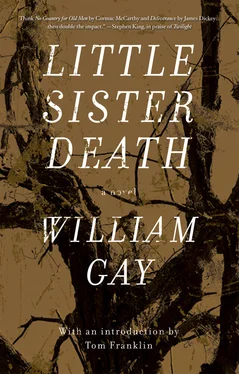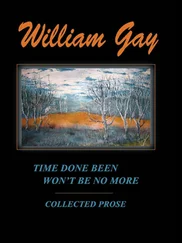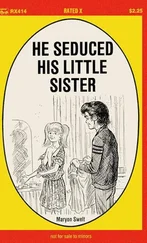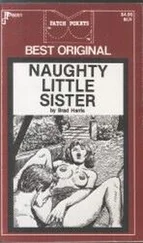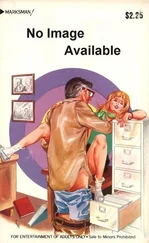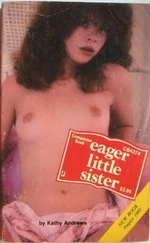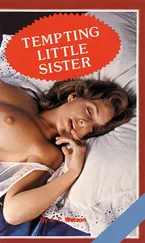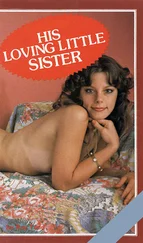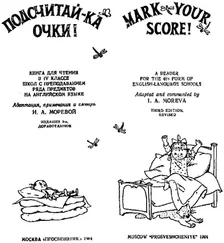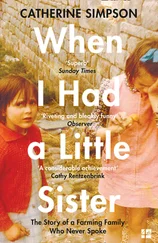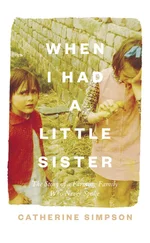Even if he had not seen Vern scrutinizing himself in the mirror, Binder would have known Vern considered himself a ladies’ man. It was inherent in the clothes he wore, a kind of pseudowestern rigging boots and a yokebacked cowboy shirt, jeans riding low on his hips. It was encoded in his very stance, a kind of urban dream of a cowboy’s lockhipped work. The very essence of macho, Binder thought. He is a truck driver without a truck, a cowboy squinting in a carbon monoxide sunset.
There was other evidence as well. Sitting on the porch before supper, Vern had told him while Corrie and her sister Ruthie were in the kitchen.
You talk about women, Vern said. Boy, you know a motel operator meets a world of women.
Is that a fact, Binder said noncommittally.
Vern lowered his voice, glanced toward the screen door. It damn sure is. Them old gals on the run…dodgin their husbands, dodgin their boyfriends…calling me up at all hours to come down to their rooms, this ain’t right, that ain’t right. Givin me them up-and-down looks. That old long eye. Run in, run out, what’s Ruthie to know? What’s fifteen minutes?
Fifteen minutes is not very long, Binder said bemusedly, studying the wind in the sedge above the creek, the gradations of failing light. Binder could look at seemingly insignificant things for hours, losing himself in them. Now he was far away, lost in last week’s work, before Vern and Ruthie came for the Labor Day holiday.
Vern considered Binder’s reply for a time. What’s that supposed to mean? Fifteen minutes is not very long.
It doesn’t mean anything.
Vern was placated. He leaned closer, gouged Binder in the ribs with an elbow, winked. This old gal one time, he said, peering intently into Binder’s face, said she was from Omaha. Rung me up on room service and I went down there and knocked on the door. Come in, she says. Son, she was spread out there on the bed buck naked. I mean not a stitch on. That thing gaped open like a alligator’s mouth.
Binder didn’t say anything.
Don’t you believe me?
Sure, Binder said.
How come you keep backing up?
I’m not backing up.
Yes, you are.
You get right up in my face to talk, Vern. I can hear you very well. I never could stand anybody right up in my face. The territorial imperative, I guess.
The what?
I never did like anybody grabbing my arm, either, Binder said, disengaging the fingers from his bicep.
Vern studied him. Maybe you’re a latent homosexual, he said.
And maybe you’re full of shit, Binder said amiably.
But the main reason Binder knew what Vern was was he had seen him looking at Corrie. Corrie had on a pair of very tight faded jeans and Vern had been staring at her crotch, where the denim was pulled taut over the upthrust pelvic bone. Corrie had been looking away toward the creek, the sun in her face, animatedly talking to Ruthie, unaware of Vern’s scrutiny. Like the true ladies’ man he was, Vern didn’t care who was looking. He was staring at her crotch with a kind of constrained hunger, momentarily forgetting where he was or that Ruthie and Binder might be watching. Binder remembered Vern’s face with a kind of clinical detachment, as if he was watching the curious behavior of a stranger in a crowd. He told himself he had no feelings about it one way or another.
He just remembered it was all.
They played cards for a while. Binder and Vern were bored. Corrie and Ruthie weren’t bored: they were sisters, and they didn’t see each other very much. They had a lot to talk about, everything was a joke. It was a long way to Orlando, and Ruthie and Vern were always tied up at the motel.
Watching her study her cards, Binder thought how much Ruthie had changed. He remembered when he and Corrie married she had been an attractive girl, a little heavy on the baby fat, maybe, but with an aura of raw sexual awareness she made Binder immediately aware of. She’d treated him with a sort of big sisterly approach that seemed somehow tentative, subject to change at a moment’s notice. Now she just projected an overblown blow-siness. There was a haphazard look to her and the dark roots of her blond hair were showing. Looking at Ruthie and Corrie together, Binder thought sardonically, Well, I got the pick of the litter all right.
Say, you got something to drink? Vern asked him.
I don’t know. I think there’s part of a bottle of Scotch around here somewhere. Do you know where it is, Corrie?
Somewhere in the cabinet. I remember putting it there.
What’s the matter with you? You quit?
I seldom drink anymore.
He seldom drinks anymore. Ain’t that pretty. Ain’t that just like a writer. Writers seldom drink anymore. Anybody else would just say they quit.
He didn’t say he quit, Vern, Ruthie said. He says he doesn’t drink much. Quit picking on him.
You probably smoke that old dope, don’t you?
No.
Ruthie turned to Binder. He’s not happy unless he’s picking at somebody. I don’t know what’s the matter with him. Picking is what he does best.
As if to remove all doubt of this, Vern continued. Will there be any women at this forsaken dance?
It’s not a forsaken dance.
Vern was a few years older than Binder, and he seemed to have something to prove to him.
Will you please not be rude? Corrie had asked. I know you don’t like Vern, but just try to get along for my sake.
All right, Binder had promised, and watching her face now across the card table he regretted it. He saw nothing left of the sweet gratuity that had been there, and he thought: she likes them. She really does. Vern too. And he saw suddenly that they were no longer two couples. They had become three of a kind and a wild card.
While they slept, he went with his morning coffee toward the toolshed. The grass was lush and heavy with dew. Fog followed the line of the creek, crept ephemeral as smoke into the rank, weedy bottomland. Then the sun seemed to ascend visibly, the fog ascending with it coincident with a chorus of cicadas arising from the field and a crisp warm smell of summer dying. Already there was a remote look of distance to the heavens.
Night seemed to linger in the cloistered dark in the toolshed. He stood in the doorway for a moment, allowing his eyes to adjust to the diminished light. Objects formed out of formlessness, as if creating themselves: the dank earth floor, old oddments of metal, a motley of broken tools. A row of mason jars of cloudylooking foodstuffs. He could smell the dryly sour odor of years-old onions strung on the walls. Provender the optimistic old lady Abernathy had put by for a winter she didn’t live to see.
It was there, lying in the fingers of sunlight that fell solid through the broken shakes. At first glance a once-gaudy scarf sun-aged to a faded iridescence, gleaming in the sun, burnished, metallic. He approached the board floor cautiously, hunkered on the dank earth watching the snake. Its head was toward him yet he moved with such stealthy caution it did not stir. Perhaps it dozed behind eternally open eyes, lulled by the timeless sanctity of the toolshed, or maybe it knew him by now.
He had come to kill it the first time he had seen it. A badly frightened and stillsobbing Corrie had decreed that it die, and he had stood leaning over it with an iron tamping bar in his hands, forty or fifty pounds of rusty metal that would have crushed its newpenny head to an unrecognizable wafer of mangled flesh. He held it paused a foot above the snake’s head, feeling its weight, knowing that it would fall, but it did not.
He did not know exactly what had forestalled him. Certainly it did not look defenseless: a yard long and thicker than his wrist, with a lethal look of evil about it. It looked quite capable of taking care of itself. But maybe it’s a female, he thought. Perhaps it has young. Who will suckle them? Why didn’t Mommy come home, they would ask, though he did not believe it. There was nothing of the mother about her. The bar’s weight heavier, his muscles knotted holding it, but still it would not fall, and he realized he was caught by eerie and evil beauty. Its skin looked coppery and bright, so iridescent there seemed to be depths to it, as if he could see through to the evil at its core, layered like the skin of an onion.
Читать дальше
